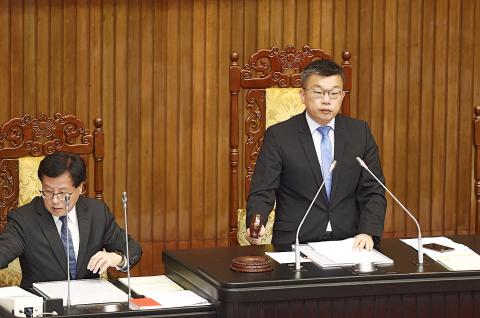The Legislative Yuan yesterday abolished a provision in Article 95 of the Electricity Act (電業法) stipulating that all nuclear energy generation facilities must stop operations before 2025.
The amendment was passed in compliance with the result of last year’s Referendum No. 16, which asked: “Do you agree that subparagraph 1, Article 95 of the Electricity City, which reads: ‘Nuclear-energy-based power-generating facilities shall wholly stop running by 2025,’ should be abolished?”
The referendum passed with 5.89 million “yes” votes and 4.01 million “no” votes.

Photo: George Tsorng, Taipei Times
The article now states that the government should set plans to move forward work on the final disposition of low-level nuclear waste, so as to deal with the low-level waste currently stored on Orchid Island (Lanyu, 蘭嶼).
The National Nuclear Abolition Action Platform said that the result of the referendum does not mean the public is not concerned about nuclear power and the global trend toward renewable energy shows that using nuclear energy is by no means the right path.
The referendum does not affect the government’s goal of achieving a nuclear-power free homeland, the group said in a statement.
Citing opposition by local governments and the problem of nuclear waste disposal, Minister of Economic Affairs Shen Jong-chin (沈榮津) in January said that Taiwan would not extend the service life of its nuclear power plants.
He added that it would not finish the Fourth Nuclear Power Plant, whose completion was blocked by popular opposition in 2014 and then mothballed.
Among Taiwan’s three active nuclear power plants, the first two are expected to be decommissioned by March 2023 and the third by May 2025.
Nuclear power supporters have argued that Taiwan should complete the Fourth Nuclear Power Plant or extend the service life of existing ones to safeguard against power shortages.
On March 19, they drafted a proposal for a new referendum question that would ask voters if they agree with completing the Fourth Nuclear Power Plant project and putting it into operation.
The proposal passed an initial screening and is awaiting verification of signatures by household registration offices.

Taiwan is stepping up plans to create self-sufficient supply chains for combat drones and increase foreign orders from the US to counter China’s numerical superiority, a defense official said on Saturday. Commenting on condition of anonymity, the official said the nation’s armed forces are in agreement with US Admiral Samuel Paparo’s assessment that Taiwan’s military must be prepared to turn the nation’s waters into a “hellscape” for the Chinese People’s Liberation Army (PLA). Paparo, the commander of the US Indo-Pacific Command, reiterated the concept during a Congressional hearing in Washington on Wednesday. He first coined the term in a security conference last

Prosecutors today declined to say who was questioned regarding alleged forgery on petitions to recall Democratic Progressive Party (DPP) legislators, after Chinese-language media earlier reported that members of the Chinese Nationalist Party (KMT) Youth League were brought in for questioning. The Ministry of Justice Investigation Bureau confirmed that two people had been questioned, but did not disclose any further information about the ongoing investigation. KMT Youth League members Lee Hsiao-liang (李孝亮) and Liu Szu-yin (劉思吟) — who are leading the effort to recall DPP caucus chief executive Rosalia Wu (吳思瑤) and Legislator Wu Pei-yi (吳沛憶) — both posted on Facebook saying: “I

Sung Chien-liang (宋建樑), who led efforts to recall Democratic Progressive Party (DPP) Legislator Lee Kun-cheng (李坤城), was released on bail of NT$80,000 today amid outcry over his decision to wear a Nazi armband to questioning the night before. Sung arrived at the New Taipei District Prosecutors’ Office for questioning in a recall petition forgery case last night wearing a red armband bearing a swastika, carrying a copy of Adolf Hitler’s Mein Kampf and giving a Nazi salute. Sung left the building at 1:15am without the armband and covering the book with his coat. Lee said today that this is a serious

Firefighters are working to put out a fire on Taipei’s Yangmingshan (陽明山) reported earlier this morning. The cause of the fire is still under investigation. The Taipei Fire Department said it received a report of a fire at Xiaoyoukeng (小油坑) at 11:17am, dispatching four command vehicles, 16 firetrucks, one ambulance and 72 personnel. The fire is still burning on about 250m² of land, according to initial estimates, as eyewitnesses reported seeing smoke rising from the mountain. The Yangmingshan National Park Headquarters on Facebook said the Qixingshan (七星山) hiking trail starting from Xiaoyoukeng and the Xiaoyoukeng parking lot are closed as firefighters work to put